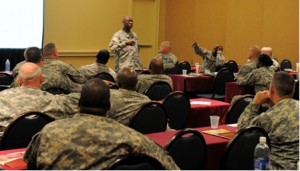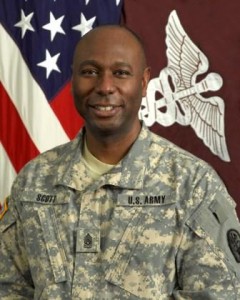By CSM Benjamin H. Scott, Jr., WTC Command Sergeant Major

CSM Benjamin H. Scott, Jr., the WTC Command Sergeant Major, spoke with several senior noncommissioned officers during the training conference held in Orlando, FL.
Last week, I had the opportunity to meet with Sergeants Major, First Sergeants, and Senior NCOs from several Warrior Transition Units (WTUs), Community Based Warrior Transition Units (CBWTUs), and the Army Wounded Warrior Program (AW2) during the Warrior Care and Transition Program (WCTP) Training Conference held in Orlando, FL.
During this Senior NCO meeting, I reinforced the idea of communication within our command and among each other resulting in a positive impact for the severely wounded, ill, and injured Soldiers and Veterans.
I also listened to the NCO leadership express concerns, frustrations, and issues that plague them at their locations. Their suggestions and concerns have not gone unheard. The purpose of the WCTP Training Conference was to bring these ideas to the table, because if you don’t ask, you won’t get. While the Warrior Transition Command has come a long way, we still have a way to go, and the feedback from the Sergeants Major and First Sergeants will greatly improve the path to excellence.
A key component to the way ahead is understanding and implementing the Comprehensive Transition Plan (CTP). The CTP will help strengthen the leadership in the WTUs, Military Treatment Facilities, and the Senior Commanders—allowing for the best care possible.
So many times, my boss, BG Darryl A. Williams has stated, “CTP is the core of what we do.” And I completely agree. In order for the CTP to be successful, we have to support it, own it, and live it. We are not simply setting the standards, but creating a foundation that will help these Soldiers and Veterans succeed for the rest of their lives. I’m not saying we can resolve all issues immediately, but we can’t take the necessary steps to fix something if we don’t know there is a problem that needs fixing. And the CTP helps us get at this realization.
The bottom line is that the CTP is a big deal.
BG Williams and I are committed to making this program a success by ensuring all severely wounded, ill and injured Soldiers and Veterans have the necessary tools and equipment to succeed and excel throughout their lives.
We will continue to stress the importance of the CTP and its essential role in ensuring the Soldiers, Veterans and their Families have the ultimate level of care and support that is standardized throughout the Army.
Along with our commitment to these Soldiers, Veterans, and Families, my personal commitment—and one that I stressed to the Senior NCOs during our meeting—is enforce the standards with compassion.
Read more about the Comprehensive Transition Plan on the WTC website.



